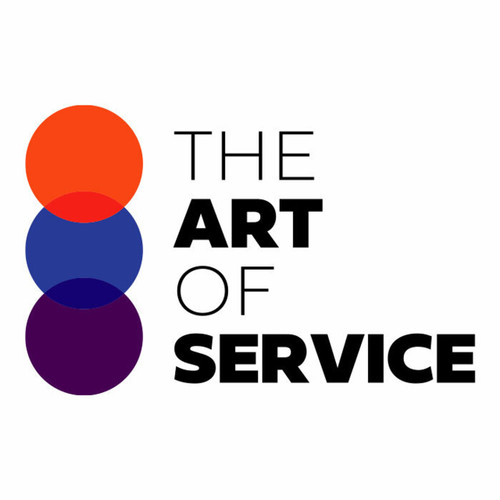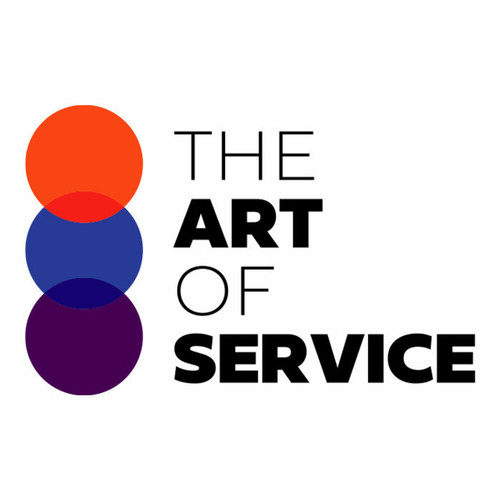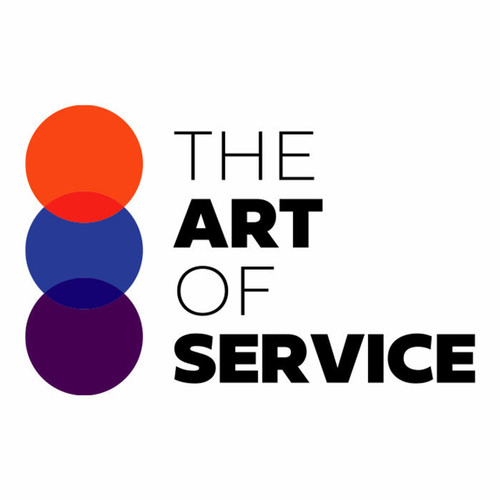Are you tired of compromising your values for the sake of profit? Are you looking for a way to balance the needs of stakeholders and make a positive impact on the world while still achieving success in business? Look no further, because our Stakeholder Capitalism and Ethical Marketer Knowledge Base is here to help.
With over 1500 prioritized requirements, solutions, benefits, and results, this knowledge base is the ultimate guide for those seeking to build an ethical and socially responsible brand.
We understand that urgency and scope are crucial factors when making important business decisions, which is why our knowledge base covers the most important questions to ask to get results in the most efficient and effective manner.
But it′s not just about doing good – our knowledge base also emphasizes the benefits for your brand.
By following our recommendations, you can create a strong and trustworthy reputation, attract loyal customers, and increase profitability in the long run.
Our case studies and use cases showcase real-life examples of companies who have adopted stakeholder capitalism and ethical marketing and have seen significant success.
Compared to competitors and alternatives, our Stakeholder Capitalism and Ethical Marketer Knowledge Base is unparalleled in its depth and breadth.
This is a must-have resource for professionals in the industry, providing detailed specifications and product types for easy implementation.
And for those who prefer a DIY or affordable alternative, our knowledge base offers clear instructions and insights to guide you through the process.
But it′s not just for professionals – our knowledge base is also beneficial for businesses of all sizes.
Whether you are a small startup or a large corporation, our knowledge base provides valuable insights and research on how to integrate stakeholder capitalism and ethical marketing into your business strategy.
We understand that cost is always a consideration, especially for businesses.
That′s why our knowledge base is priced competitively and offers a variety of options to fit your budget.
And when it comes to pros and cons, the benefits of adopting stakeholder capitalism and ethical marketing far outweigh any potential drawbacks.
In a connected world where consumers are becoming increasingly socially conscious, it′s more important than ever for businesses to prioritize ethics and responsibility.
Our Stakeholder Capitalism and Ethical Marketer Knowledge Base is your go-to resource for achieving this balance, and ultimately, creating a positive impact on the world while still achieving profitability.
Don′t miss out on this valuable opportunity – get your copy today!
Discover Insights, Make Informed Decisions, and Stay Ahead of the Curve:
Key Features:
Comprehensive set of 1510 prioritized Stakeholder Capitalism requirements. - Extensive coverage of 52 Stakeholder Capitalism topic scopes.
- In-depth analysis of 52 Stakeholder Capitalism step-by-step solutions, benefits, BHAGs.
- Detailed examination of 52 Stakeholder Capitalism case studies and use cases.
- Digital download upon purchase.
- Enjoy lifetime document updates included with your purchase.
- Benefit from a fully editable and customizable Excel format.
- Trusted and utilized by over 10,000 organizations.
- Covering: Data Privacy, Triple Bottom Line, Social Responsibility, Carbon Footprint, Human Rights, Community Engagement, Purpose Driven Leadership, Ethical AI, Animal Welfare, Equal Opportunities, Conscious Consumption, Shared Value, Climate Action, Ethical Supply Chain, Corporate Social Responsibility, Supply Chain Transparency, Regenerative Agriculture, Mental Health, Corp Certification, Code Of Ethics, Living Wage, Plastic Waste, Ethical Advertising, Ethical Sourcing, Sustainable Branding, Minimum Wage, Flexible Working, Employee Well Being, Work Life Balance, Regenerative Design, Disability Inclusion, Stakeholder Capitalism, Pay Equity, Indigenous Rights, Inclusive Marketing, Ethical Data Practices, Eco Friendly Packaging, Net Positive, Cause Marketing, Data Ethics, Circular Economy, Fair Trade, Shared Ownership, Gender Equality, Ethical Consumer, Open Source, Supply Chain Management, Green Marketing, Employee Activism, Ethical Investing, Sustainable Development Goals, Responsible Innovation
Stakeholder Capitalism Assessment Dataset - Utilization, Solutions, Advantages, BHAG (Big Hairy Audacious Goal):
Stakeholder Capitalism
Corporate sustainability teams play a crucial role in implementing stakeholder capitalism by integrating social, environmental, and economic considerations into business strategy, ensuring long-term value creation for all stakeholders.
1. Identify stakeholder needs: Conduct materiality assessments to prioritize stakeholder concerns.
- Builds trust and strengthens relationships with stakeholders.
2. Set sustainability goals: Align goals with stakeholder needs and UN SDGs.
- Improves brand reputation and long-term business success.
3. Collaborate across departments: Engage all functions in sustainability efforts.
- Fosters innovation and ensures successful implementation.
4. Measure and report progress: Use credible frameworks (GRI, SASB, TCFD).
- Enhances transparency and accountability.
5. Engage board and C-suite: Secure leadership buy-in and support.
- Ensures sustainability is embedded in corporate strategy.
6. Advocate for policy change: Partner with NGOs and policymakers.
- Strengthens industry standards and drives systemic change.
7. Foster a culture of purpose: Empower employees to contribute to sustainability.
- Boosts morale, retention, and productivity.
CONTROL QUESTION: What is the role of corporate sustainability teams to put stakeholder capitalism into practice?
Big Hairy Audacious Goal (BHAG) for 10 years from now: A big hairy audacious goal for stakeholder capitalism in 10 years could be for corporate sustainability teams to play a central role in driving the transition to a just and equitable society, where businesses prioritize the long-term well-being of all stakeholders, including employees, customers, communities, and the environment.
To achieve this goal, corporate sustainability teams could focus on the following areas:
1. Advocating for and implementing sustainable business practices that prioritize the long-term well-being of all stakeholders, rather than just short-term profits. This could include setting ambitious greenhouse gas reduction targets, investing in renewable energy and energy efficiency, and promoting circular economy principles.
2. Working to ensure that all employees are treated fairly and equitably, with a focus on diversity, equity, and inclusion. This could include implementing policies and practices to promote gender and racial diversity in the workplace, providing equal pay for equal work, and creating opportunities for employee development and advancement.
3. Engaging with communities to understand and address their needs and concerns, and working to create positive social and environmental impacts. This could include investing in community development projects, partnering with local organizations, and supporting initiatives that promote social and environmental justice.
4. Ensuring that the company′s supply chain is transparent and ethical, with a focus on human rights, labor standards, and environmental sustainability. This could include conducting regular audits of suppliers and working with them to improve their practices.
5. Advocating for public policies that support sustainable development, such as carbon pricing, clean energy incentives, and social welfare programs.
By focusing on these areas, corporate sustainability teams can help to create a more just and equitable society, where businesses prioritize the long-term well-being of all stakeholders. This is the essence of stakeholder capitalism, and it is a goal that is both audacious and worthy of pursuit.
Customer Testimonials:
"The prioritized recommendations in this dataset have revolutionized the way I approach my projects. It`s a comprehensive resource that delivers results. I couldn`t be more satisfied!"
"The continuous learning capabilities of the dataset are impressive. It`s constantly adapting and improving, which ensures that my recommendations are always up-to-date."
"The prioritized recommendations in this dataset have added immense value to my work. The data is well-organized, and the insights provided have been instrumental in guiding my decisions. Impressive!"
Stakeholder Capitalism Case Study/Use Case example - How to use:
Title: The Role of Corporate Sustainability Teams in Putting Stakeholder Capitalism into Practice: A Case StudySynopsis of the Client Situation:
The client is a multinational corporation in the technology sector with a significant environmental footprint and growing concerns regarding social responsibility. The company′s management acknowledges the importance of stakeholder capitalism and the need to balance the interests of all stakeholders, including shareholders, employees, customers, suppliers, communities, and the environment. However, they lack a clear strategy and organizational structure to implement stakeholder capitalism effectively.
Consulting Methodology:
The consulting approach comprised three phases: (1) assessment and analysis, (2) strategy development, and (3) implementation planning.
1. Assessment and Analysis:
During this phase, the consulting team conducted a thorough analysis of the client′s current practices, policies, and performance related to sustainability and stakeholder management. This included a materiality assessment, stakeholder engagement, and benchmarking against industry peers and best practices.
2. Strategy Development:
Based on the findings from the assessment phase, the consulting team collaborated with the client to develop a comprehensive stakeholder capitalism strategy. This strategy outlined clear goals, targets, and initiatives aligned with the United Nations Sustainable Development Goals (SDGs) and other relevant frameworks. It also identified the role of the corporate sustainability team in driving the strategy forward.
3. Implementation Planning:
The final phase focused on developing a detailed implementation plan, including the organizational structure, roles and responsibilities, and key performance indicators (KPIs) for the corporate sustainability team.
Deliverables:
The consulting team delivered the following key deliverables:
1. Stakeholder Capitalism Strategy: A comprehensive strategy outlining the client′s approach to stakeholder capitalism, including goals, targets, and initiatives.
2. Organizational Structure: A proposed organizational structure for the corporate sustainability team, including roles, responsibilities, and reporting lines.
3. KPIs and Management Considerations: A set of KPIs and management considerations to track progress and ensure the effective implementation of the stakeholder capitalism strategy.
Implementation Challenges:
The implementation of stakeholder capitalism faces several challenges, including:
1. Resistance to Change: Employees, particularly those in traditional business functions, may resist the changes required to implement stakeholder capitalism.
2. Data and Metrics: Gathering accurate, reliable, and comparable data to measure progress and report on sustainability performance can be challenging.
3. Long-Term Focus: Stakeholder capitalism requires a long-term focus, which may conflict with short-term financial pressures.
KPIs and Management Considerations:
To monitor the implementation of stakeholder capitalism, the following KPIs are recommended:
1. Environmental KPIs: Energy consumption, greenhouse gas emissions, water usage, and waste generation.
2. Social KPIs: Employee engagement, diversity and inclusion, community investments, and human rights performance.
3. Financial KPIs: Total shareholder return, return on equity, and cost of capital.
To ensure the effective implementation of stakeholder capitalism, management should consider the following:
1. Establish a clear mandate and accountability for the corporate sustainability team.
2. Integrate sustainability considerations into business strategy, decision-making processes, and performance management systems.
3. Engage with stakeholders regularly to understand their expectations, concerns, and needs.
Citations:
1. International Organization of Corporate Governance (2020). The Role of the Board in Corporate Sustainability.
2. KPMG (2020). The KPMG Survey of Sustainability Reporting 2020.
3. Harvard Business Review (2019). The Stakeholder Strategy.
4. Business Roundtable (2019). Statement on the Purpose of a Corporation.
5. World Economic Forum (2021). The Global Risks Report 2021.
6. McKinsey u0026 Company (2020). How Sustainability can Drive Financial Performance.
7. Deloitte (2020). The Stakeholder Enterprise.
8. Stanford Graduate School of Business (2020). Stakeholder Capitalism: A Call for Companies to Rethink Purpose.
Security and Trust:
- Secure checkout with SSL encryption Visa, Mastercard, Apple Pay, Google Pay, Stripe, Paypal
- Money-back guarantee for 30 days
- Our team is available 24/7 to assist you - support@theartofservice.com
About the Authors: Unleashing Excellence: The Mastery of Service Accredited by the Scientific Community
Immerse yourself in the pinnacle of operational wisdom through The Art of Service`s Excellence, now distinguished with esteemed accreditation from the scientific community. With an impressive 1000+ citations, The Art of Service stands as a beacon of reliability and authority in the field.Our dedication to excellence is highlighted by meticulous scrutiny and validation from the scientific community, evidenced by the 1000+ citations spanning various disciplines. Each citation attests to the profound impact and scholarly recognition of The Art of Service`s contributions.
Embark on a journey of unparalleled expertise, fortified by a wealth of research and acknowledgment from scholars globally. Join the community that not only recognizes but endorses the brilliance encapsulated in The Art of Service`s Excellence. Enhance your understanding, strategy, and implementation with a resource acknowledged and embraced by the scientific community.
Embrace excellence. Embrace The Art of Service.
Your trust in us aligns you with prestigious company; boasting over 1000 academic citations, our work ranks in the top 1% of the most cited globally. Explore our scholarly contributions at: https://scholar.google.com/scholar?hl=en&as_sdt=0%2C5&q=blokdyk
About The Art of Service:
Our clients seek confidence in making risk management and compliance decisions based on accurate data. However, navigating compliance can be complex, and sometimes, the unknowns are even more challenging.
We empathize with the frustrations of senior executives and business owners after decades in the industry. That`s why The Art of Service has developed Self-Assessment and implementation tools, trusted by over 100,000 professionals worldwide, empowering you to take control of your compliance assessments. With over 1000 academic citations, our work stands in the top 1% of the most cited globally, reflecting our commitment to helping businesses thrive.
Founders:
Gerard Blokdyk
LinkedIn: https://www.linkedin.com/in/gerardblokdijk/
Ivanka Menken
LinkedIn: https://www.linkedin.com/in/ivankamenken/







